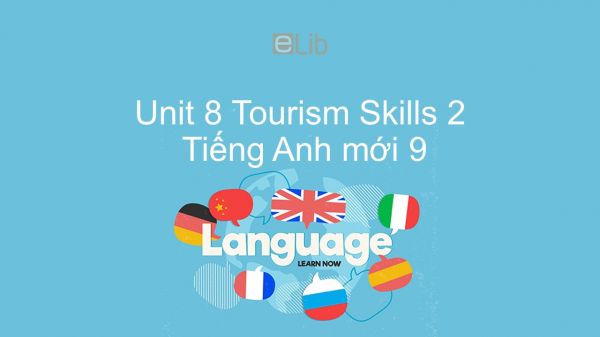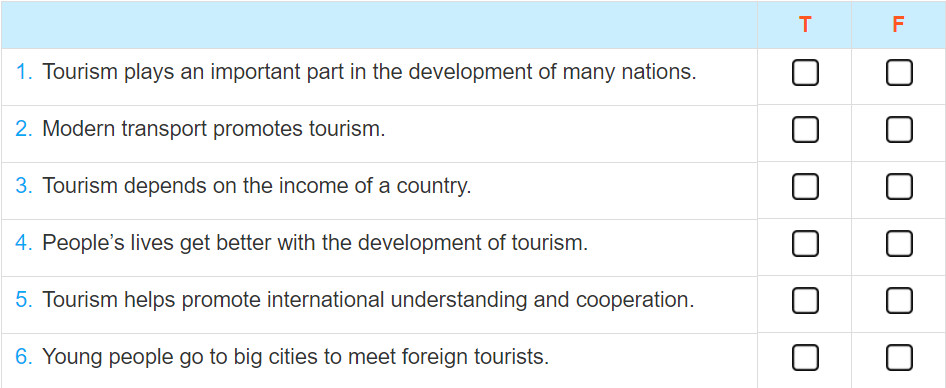Unit 8 lớp 9: Tourism - Skills 2
Nhằm giúp các em rèn luyện hai kĩ năng cơ bản trong Tiếng Anh là Listening và Writing, phần Skills 2 - Unit 8 hướng dẫn các em nghe về các đặc điểm của ngành du lịch ở Việt Nam và viết về các tác động tiêu cực của ngành du lịch ở địa phương các em.
Mục lục nội dung

1. Listening
1.1. Task 1 Unit 8 lớp 9
Work in pairs. Is tourism important to Viet Nam? Give at least one reason. (Làm việc theo cặp. Ngành du lịch có quan trọng với Việt Nam không? Cho ít nhất một lý do.)
Guide to answer
Of course, it is. Viet Nam is famous for natural beauty, local cuisine and traditional customs, which attracts lots of tourists every year. Tourism is the industry contributes a big part of the GDP (Gross domestic product), improve the standard of living of local people, creates thousands of jobs and this industry is also very potential in the future.
(Đương nhiên rồi. Việt Nam nổi tiếng với vẻ đẹp tự nhiên, ẩm thực địa phương và những phong tục cổ truyền, điều mà hấp dẫn rất nhiều du khách mỗi năm. Ngành du lịch đóng góp một phần lớn vào GDP (Tổng sản phẩm quốc nội), cải thiện đời sống của người dân địa phương, tạo ra hàng nghìn việc làm và ngành công nghiệp này cũng vô cùng có tiềm năng trong tương lai.)
1.2. Task 2 Unit 8 lớp 9
Listen to the lecture and tick (√) true (T) or false (F). (Nghe bài diễn thuyết và đánh dấu đúng hoặc sai)
Click to listen

Guide to answer
1. T 2. T 3. F 4. T 5. T 6. F
Tạm dịch:
1. Ngành du lịch đóng vai trò quan trọng với sự phát triển của nhiều quốc gia.
2. Giao thông hiện đại thúc đẩy ngành du lịch.
3. Ngành du lịch phụ thuộc vào thu nhập của quốc gia.
4. Cuộc sống của mọi người tốt hơn với sự phát triển của du lịch.
5. Ngành du lịch giúp thúc đẩy hiểu biết và hợp tác quốc tế.
6. Những người trẻ tuổi đi đến những thành phố lớn để gặp du khách nước ngoài.
Audio Script:
Thanks to the widespread use of modern means of transport, people have more choice of holiday restination and can now visit even the remotest parts of the world. Tourism has certainly become an important factor in the development of many countries.
An obvious benefit of tourism is that it plays a key role in economic growth. It contributes greatly to income of a region or country. It also brings job opportunities to all kinds of people, and therefore helps promote prosperity in diverse fields. Another positive aspect of tourism is that it helps promote international understanding and cooperation among nations. In addition, tourism can improve the standard of living of local or rural communities, so young people are encouraged to stay in their hometown to build a good life rather than move to big cities. Finally, tourism brings cultural benefits, learn about the history and culture of a place, and spread them around the world.
In the other hand, the drawbacks of tourism can't be denied ...
Tạm dịch:
Nhờ vào việc sử dụng rộng rãi của các phương tiện giao thông hiện đại, mọi người có nhiều lựa chọn hơn cho kì nghỉ lễ và bây giờ thậm chí có thể tới thăm những nơi xa xôi nhất của thế giới. Du lịch chắc chắn đã trở thành một yếu tố quan trọng trong sự phát triển của nhiều quốc gia.
Một lợi ích rõ ràng của du lịch là đóng vai trò quan trọng trong tăng trưởng kinh tế. Đóng góp rất lớn cho thu nhập của một vùng hay một quốc gia. Du lịch cũng mang lại cơ hội việc làm cho tất cả mọi người, vì vậy đã giúp thúc đẩy nhiều lĩnh vực khác nhau phát triển thịnh vượng. Một khía cạnh tích cực khác của du lịch là giúp thúc đẩy sự hiểu biết và hợp tác quốc tế giữa các quốc gia. Ngoài ra, du lịch có thể cải thiện mức sống của cộng đồng địa phương hoặc nông thôn, vì vậy người trẻ được khuyến khích ở lại quê hương để xây dựng một cuộc sống ấm no thay vì chuyển đến các thành phố lớn. Cuối cùng, du lịch mang lại lợi ích văn hoá, tìm hiểu về lịch sử và văn hoá của một nơi, và truyền bá những giá trị lịch sử văn hóa đó ra khắp thế giới.
Mặt khác, những hạn chế của du lịch là không thể phủ nhận...
1.3. Task 3 Unit 8 lớp 9
Listen again and choose the correct answer. (Nghe lại và chọn câu trả lời đúng)
Click to listen
The next part of the lecture probably continues to discuss... (Đoạn tiếp theo của bài diễn thuyết có thể tiếp tục thảo luận về...)
A. other benefits of tourism (những lợi ích khác của ngành du lịch)
B. the tourism industry in Viet Nam (ngành du lịch ở Việt Nam)
C. the negative effects of tourism (những ảnh hưởng tiêu cực của ngành du lịch)
Guide to answer
C. the negative effects of tourism
2. Writing
2.1. Task 4 Unit 8 lớp 9
Work in groups. Talk about the negative effects of tourism on a region or country. The following ideas may be helpful to you. (Làm việc theo nhóm. Nói về những ảnh hưởng tiêu cực của ngành du lịch đối với khu vực hay đất nước. Những ý tưởng sau đây có thể giúp ích cho bạn)
- Natural environment is damaged. (Môi trường thiên nhiên bị phá hủy)
- Natural beauty is spoiled. (Vẻ đẹp thiên nhiên bị thiệt hại)
- Traditional ways of life are affected. (Lối sống truyền thống bị ảnh hưởng)
- Social problems may arise. (Những vấn đề xã hội có thể phát sinh)
2.2. Task 5 Unit 8 lớp 9
Choose one negative effect that you discussed above and write a paragraph about it. Make sure you use the right connectors. (Chọn một ảnh hưởng tiêu cực mà bạn đã thảo luận ở trên và viết một đoạn văn về nó. Đảm bảo sử dụng từ nối phù hợp)
First/Firstly/The first.. ./One of the...
Second/Secondly/Another...
Third/Thirdly/Furthermore/In addition...
Guide to answer
One of the drawbacks of tourism is the damage to the environment of a country or area. In the first place, tourists use a lot of local resources such as water, food, energy, etc., and this puts pressure on the environment. Secondly, there is the problem of pollution. Many cities and towns become overcrowded tourists, with all their vehicles causing traffic jams as well as air and noise pollution. Another bad effect of tourism is the destruction of wildlife in some places. The habitat of wild plants and animals is lost because of the building of tourist resorts, and by visitors' activities. In short, the development of tourism has bad effects on the environment.
Tạm dịch:
Một trong những hạn chế của du lịch là gây hại cho môi trường của một quốc gia hoặc khu vực. Trước tiên, du khách sử dụng rất nhiều nguồn tài nguyên địa phương như nước, thực phẩm, năng lượng, vân vân, và điều này gây áp lực cho môi trường. Thứ hai, vấn đề ô nhiễm. Nhiều thành phố và thị trấn trở nên quá tải khách du lịch, với nhiều xe gây ra ùn tắc giao thông cũng như ô nhiễm không khí và tiếng ồn. Một hiệu ứng xấu khác của du lịch là sự phá hủy môi trường hoang dã ở một số nơi. Môi trường sống của các loài thực vật hoang dã bị mất do xây dựng các khu du lịch và các hoạt động của du khách. Tóm lại, sự phát triển của du lịch có những ảnh hưởng xấu đến môi trường.
3. Practice Task 1
Choose the word or phrase among A, B, Cor D that best fits the blank space in the following passage.
My Experience on an Elephant Safari
We went on an elephant safari at a place (1)…… Camp Jubalani in South Africa. They take visitors on safaris twice a day: once in the morning and once at night. Guests cango on as many rides as they like, but they don’t (2)…… you ride an elephant if you are younger than twelve years old. Luckily, I’m fifteen! On our first safari, I felt really scared. I remember thinking we could have gone on a beach holiday instead! As I was climbing onto the elephant, I wondered how I was going to control (3)….. a big animal. I soon (4)….. that I ought not to have worried so much. They made you sit with an experienced elephant trainer. You can’t ride (5)……. your own. During the trek, we saw giraffes, zebras, lions, and rhinos. My parents took a lot of photos. I would have taken photos myself but I’d (6)……… my camera in my room. I can’t remember exactly how long the safaris lasted, but it must have been a couple of hours because we got (7)…….. just (8)……. for lunch. We stayed at Camp Jubalani for three days and went on four elephant safaris. We could have gone on more than that, but on one of the days my mum wasn’t very well. Anyway, it was a (9)……… holiday. I’d definitely (10)…….an elephant safari.
Question 1: A. call B. is called C. called D. calling
Question 2: A. let B. make C. want D. allow
Question 3: A. so B. such C. that D. what
Question 4: A. decided B. looked C. recognized D. realized
Question 5: A. by B. on C. with D. for
Question 6: A. taken B. brought C. left D. put
Question 7: A. back B. off C. up D. in
Question 8: A. at times B. late C. on time D. in time
Question 9: A. welcoming B. fantastic C. pleased D. delicious
Question 10: A. demand B. offer C. suggest D. recommend
4. Practice Task 2
Choose the best answer for each of the following sentences.
Question 1: …… have enough apples, she’ll make an apple pie this afternoon.
A. Should she B. If she C. Will she D. Unless she
Question 2: If you ………………… to me, you wouldn’t have got so much trouble.
A. listened B. would listen C. had listened D. would have listened
Question 3: If you don’t know how to spell a word, you ……… look it up in the dictionary.
A. must B. will C. should D. ought
Question 4: If the sun …………………, we ………………… for a walk.
A. shines - will go B. shone - will go
C. shone - would go D. had shone - would go
Question 5: The campfire ………………… if it ………………… last night.
A. wouldn’t be cancelled - hadn’t rained
B. wouldn’t have been cancelled - hadn’t rained
C. would have been cancelled - hadn’t rained
D. will be cancelled - rains
5. Conclusion
Kết thúc bài học, các em cần làm bài tập đầy đủ, luyện nghe về chủ đề du lịch và luyện viết về những ảnh hưởng tiêu cực của ngành du lịch trong địa phương các em; đồng thời ghi nhớ các từ vựng sau:
- widespread (adj): rộng rãi
- economic growth: sự phát triển kinh tế
- contribute (v): cống hiến, đóng góp
- prosperity (n): sự thịnh vượng
- cooperation (n): sự hợp tác
- standard of living: tiêu chuẩn sống
- spread (v): lan tỏa
- drawbacks (n): tác hại
Tham khảo thêm
- doc Unit 8 lớp 9: Tourism - Getting Started
- doc Unit 8 lớp 9: Tourism - A Closer Look 1
- doc Unit 8 lớp 9: Tourism - A Closer Look 2
- doc Unit 8 lớp 9: Tourism - Communication
- doc Unit 8 lớp 9: Tourism - Skills 1
- doc Unit 8 lớp 9: Tourism - Looking Back
- doc Unit 8 lớp 9: Tourism - Project
